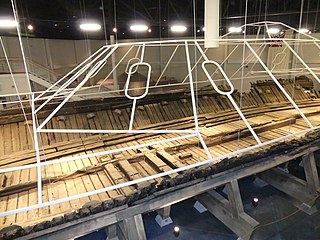USS Virginia may refer to:
USS Raleigh may refer to:
CSS North Carolina was a casemate ironclad built for the Confederate Navy in 1863 during the American Civil War by Berry & Brothers at Wilmington, North Carolina at a cost of $76,000. She was placed in commission during the latter part of the year with Commander W. T. Muse, CSN, in command.

CSS Jamestown, originally a side-wheel, passenger steamer, was built at New York City in 1853, and seized at Richmond, Virginia in 1861 for the Virginia Navy during the early days of the American Civil War. She was commissioned by the Confederate States Navy (CSN) the following July, and renamed CSS Thomas Jefferson but was generally referred to as Jamestown, after Jamestown, Virginia.
At least three ships of the Confederate States Navy were named CSS Florida in honor of the third Confederate state:

CSS Raleigh was originally a small, iron-hulled, propeller-driven towing steamer operating on the Albemarle and Chesapeake Canal. She was taken over by the State of North Carolina in May 1861, and transferred to the Confederate States the following July. Her commanding officer during 1861–1862 was Lieutenant Joseph W. Alexander. Her entire service was in coastal waters of North Carolina and Virginia and in the James River as part of the James River Squadron.
CSS Raleigh was a steam-powered Civil War casemate ironclad. She was fitted with a spar torpedo instead of an iron ram and was built in 1863–1864 by the Confederate States Navy at Wilmington, North Carolina. While she was being built her commander was Lieutenant John Wilkinson (CSN). She was put into commission on April 30, 1864 under the command of Lieutenant J. Pembroke Jones, CSN.
CSSHampton was a wooden gunboat of the Confederate States Navy, one of the few Hampton class gunboats to be built.
USS Sumter may refer to the following ships of the United States Navy:
Two ships in the Confederate Navy were named CSS Nashville in honor of Nashville, Tennessee.
Three ships in the Confederate States Navy were named CSS Tennessee
The James River Squadron was formed shortly after the secession of Virginia during the American Civil War. The squadron was part of the Virginia Navy before being transferred to the Confederate States Navy. The squadron is most notable for its role in patrolling the James River, which was the main water approach to the Confederate capital, Richmond. It had two phases: early war, when it consisted mostly of wooden ships which ended with the Battle of Drewry's Bluff on May 15, 1862; and its later ironclad composition with the flagship CSS Virginia II.

CSS Fanny was a small propeller-driven steam tug used by the Confederate States Navy to defend the sounds of northeastern North Carolina in the American Civil War. Originally armed as a gunboat and operated by the Union, she was captured in October 1861 by the Confederate Navy, and later lost at the Battle of Elizabeth City in February 1862. Due to being used as an observation balloon platform, Fanny is sometimes credited with being the first self-propelled aircraft carrier.

CSS Neuse was a steam-powered ironclad ram of the Confederate States Navy that served in the latter part the American Civil War and was eventually scuttled to avoid capture by rapidly advancing Union Army forces. In the early 1960s, she produced approximately 15,000 artifacts from her raised lower hull, the largest number ever found on a recovered Confederate vessel. The remains of her lower hull and a selection of her artifacts are on exhibit in Kinston, North Carolina at the CSS Museum, which belongs to the North Carolina Department of Natural and Cultural Resources. The ironclad is listed on the National Register of Historic Places.
CSS Tuscaloosa may refer to:
CSS Texas is the name of two ships in the Confederate States Navy:
Raleigh is the capital city of the U.S. state of North Carolina, named after Sir Walter Raleigh.

CSS Wilmington was an unnamed casemate ironclad built for the Confederate States Navy during the American Civil War. The ship was never officially named and is referred to by historians by the name of the city in which she was built. Wilmington was still under construction during the February 1865 Battle of Wilmington and was destroyed to prevent her capture by Union troops after their victory.
CSS Jeff Davis may refer to the following ships of the Confederate States Navy:
This page is based on this
Wikipedia article Text is available under the
CC BY-SA 4.0 license; additional terms may apply.
Images, videos and audio are available under their respective licenses.



